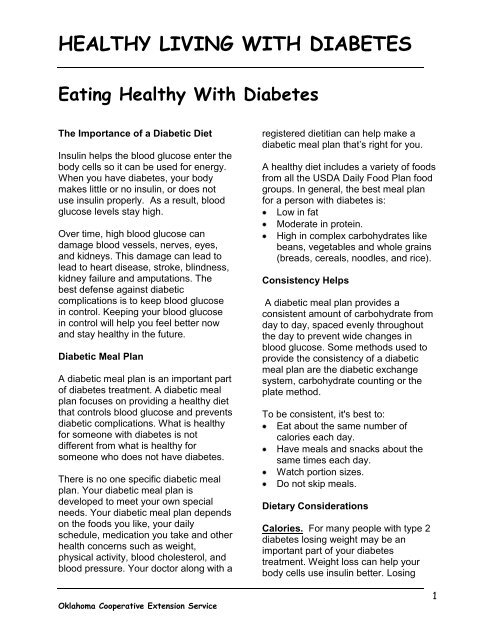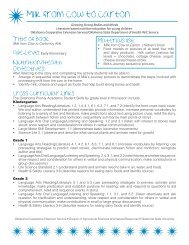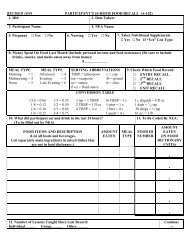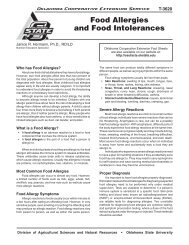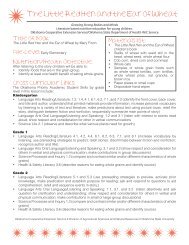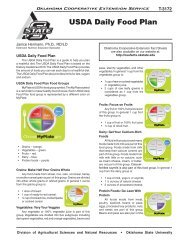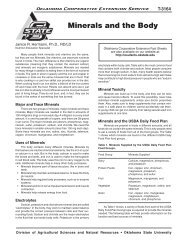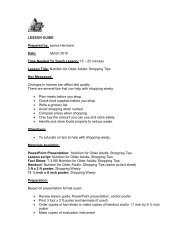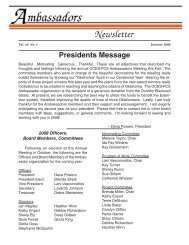healthy living with diabetes
healthy living with diabetes
healthy living with diabetes
- No tags were found...
You also want an ePaper? Increase the reach of your titles
YUMPU automatically turns print PDFs into web optimized ePapers that Google loves.
HEALTHY LIVING WITH DIABETESEating Healthy With DiabetesThe Importance of a Diabetic DietInsulin helps the blood glucose enter thebody cells so it can be used for energy.When you have <strong>diabetes</strong>, your bodymakes little or no insulin, or does notuse insulin properly. As a result, bloodglucose levels stay high.Over time, high blood glucose candamage blood vessels, nerves, eyes,and kidneys. This damage can lead tolead to heart disease, stroke, blindness,kidney failure and amputations. Thebest defense against diabeticcomplications is to keep blood glucosein control. Keeping your blood glucosein control will help you feel better nowand stay <strong>healthy</strong> in the future.Diabetic Meal PlanA diabetic meal plan is an important partof <strong>diabetes</strong> treatment. A diabetic mealplan focuses on providing a <strong>healthy</strong> dietthat controls blood glucose and preventsdiabetic complications. What is <strong>healthy</strong>for someone <strong>with</strong> <strong>diabetes</strong> is notdifferent from what is <strong>healthy</strong> forsomeone who does not have <strong>diabetes</strong>.There is no one specific diabetic mealplan. Your diabetic meal plan isdeveloped to meet your own specialneeds. Your diabetic meal plan dependson the foods you like, your dailyschedule, medication you take and otherhealth concerns such as weight,physical activity, blood cholesterol, andblood pressure. Your doctor along <strong>with</strong> aOklahoma Cooperative Extension Serviceregistered dietitian can help make adiabetic meal plan that’s right for you.A <strong>healthy</strong> diet includes a variety of foodsfrom all the USDA Daily Food Plan foodgroups. In general, the best meal planfor a person <strong>with</strong> <strong>diabetes</strong> is:Low in fatModerate in protein.High in complex carbohydrates likebeans, vegetables and whole grains(breads, cereals, noodles, and rice).Consistency HelpsA diabetic meal plan provides aconsistent amount of carbohydrate fromday to day, spaced evenly throughoutthe day to prevent wide changes inblood glucose. Some methods used toprovide the consistency of a diabeticmeal plan are the diabetic exchangesystem, carbohydrate counting or theplate method.To be consistent, it's best to:Eat about the same number ofcalories each day.Have meals and snacks about thesame times each day.Watch portion sizes.Do not skip meals.Dietary ConsiderationsCalories. For many people <strong>with</strong> type 2<strong>diabetes</strong> losing weight may be animportant part of your <strong>diabetes</strong>treatment. Weight loss can help yourbody cells use insulin better. Losing1
HEALTH LIVING WITH DIABETESweight and lowering fat intake can alsohelp lower your blood cholesterol andblood pressure, if they are high.Many people <strong>with</strong> type 2 <strong>diabetes</strong> whoare overweight are able to control theirblood glucose after they lose weight.Just a 10% weight loss may bring bloodglucose under control. Healthy weightloss should be slow, a weight loss of 1to 2 pounds per week is recommended.Eating a <strong>healthy</strong> diet <strong>with</strong> a moderatedecrease in calories combined <strong>with</strong>increased physical activity, is the bestapproach to weight loss. A moderatereduction of 500 calories per day isrecommended for weight loss. Physicalactivity recommendations are 150minutes per week of moderate-intensityor 75 minutes of vigorous-intensity perweek.Carbohydrates. In the past, people<strong>with</strong> <strong>diabetes</strong> were told to avoid sugar.We now know carbohydrates (frombread, rice, pasta, fruits and vegetables)and sugars have a similar effect onblood glucose. The total amount ofcarbohydrate is the issue, not just sugar.People <strong>with</strong> <strong>diabetes</strong> can have sugar inmoderation. However; the carbohydratefrom foods containing sugar must beworked into your meal plan.Foods high in sugar often don't provideother important nutrients you need everyday. Foods high in sugar are also oftenhigh in fat also. If you are trying to loseweight, you may want to avoid foodshigh in sugar.your doctor and/or dietitian to find outhow alcohol affects your blood glucose,and if it can be fit into your diabetic mealplan. Most people in good <strong>diabetes</strong>control can safely have a drink <strong>with</strong> ameal every so often. It is important totest your blood glucose level, before,during and after drinking. Never drink analcohol beverage on an empty stomach.Alcohol can cause low blood glucose inpeople using diabetic medication.Fat. Increased risk of high bloodcholesterol, triglycerides and heartdisease is a <strong>diabetes</strong> complication. Ifyou have high blood cholesterol yourdiabetic meal plan may be modified tobe low in fat. Weight loss also helpslower blood cholesterol and triglyceridesfor people who are overweight.Sodium. High blood pressure is a<strong>diabetes</strong> complication. If you have highblood pressure your diabetic meal planmay be modified to be low in sodium.Weight loss will also help lower bloodpressure for people who are overweight.Protein. Kidney disease is also a<strong>diabetes</strong> complication. If you havekidney disease the protein content ofyour diabetic meal plan will be modified.Sources:Whitney, E.N. & Rolfes, S.R. UnderstandingNutrition, 10th ed. Thomson/WadsworthPublishing Co., Belmont, CA., 2008.American Diabetes Association. Food & Fitness:What Can I Eat. Available at: www.<strong>diabetes</strong>.orgAlcohol. If you take insulin or oraldiabetic medication you need to talk toOklahoma Cooperative Extension Service2


